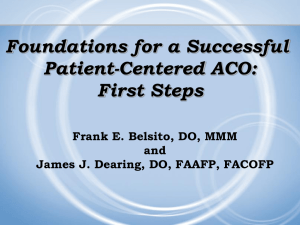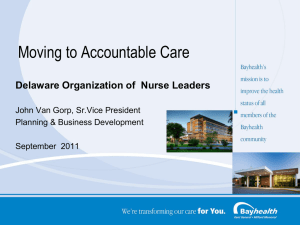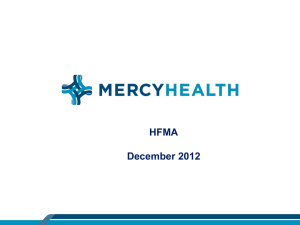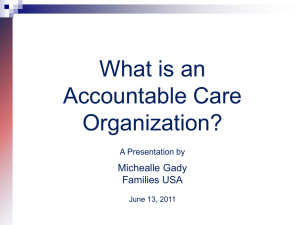ACO 1.21 Final Presentation
advertisement
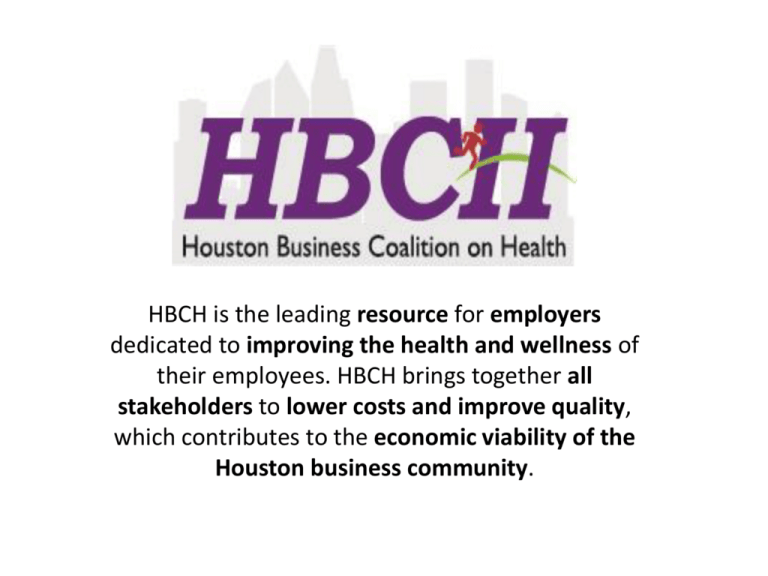
HBCH is the leading resource for employers dedicated to improving the health and wellness of their employees. HBCH brings together all stakeholders to lower costs and improve quality, which contributes to the economic viability of the Houston business community. Cumulative Increases in Health Insurance Premiums, Workers’ Contributions to Premiums, Inflation, and Workers’ Earnings, 1999-2013 250% Health Insurance Premiums 200% 196% Workers' Contribution to Premiums Workers' Earnings 182% Overall Inflation 150% 117% 119% 100% 56% 57% 50% 50% 34% 40% 14% 29% 11% 0% 1999 2000 2001 2002 2003 2004 2005 2006 2007 2008 2009 2010 2011 2012 SOURCE: Kaiser/HRET Survey of Employer-Sponsored Health Benefits, 1999-2013. Bureau of Labor Statistics, Consumer Price Index, U.S. City Average of Annual Inflation (April to April), 1999-2013; Bureau of Labor Statistics, Seasonally Adjusted Data from the Current Employment Statistics Survey, 1999-2013 (April to April). 2013 2015 Events DATE EVENT February 19 HBCH Networking Social March 10 Actionable Data Employers Should Demand in Health Plan Reports April 23 HBJ Healthiest Employers / HBCH Paragon Awards May Employer Best Practices to Demonstrate Wellness ROI June Employer Transparency Tools (co-presented with CEBS) July HBCH Networking Social September Houston’s Healthcare Delivery System–an Employer’s Perspective October Employer Survey on Purchasing Value in Healthcare December HBCH Networking Social 8:00 - 8:15 History of ACO's 8:20 - 8:40 A Hospital System ACO - KBR/Memorial Hermann 8:45 - 9:15 A Physician System ACO - City of Houston/Kelsey Seybold ACCOUNTABLE CARE ORGANIZATIONS WHAT ARE THEY; WHY ARE THEY NEEDED; HOW DO THEY WORK; DO THEY WORK – January 21, 2015 The Changing Health Care Landscape Legislative Uncertainty Provider System Redefinition Health Technology The Changing Practice of Medicine New Entrants and Disintermediators Change and the Employee Value Proposition Implications for Employers Workforce Benefits Business Understand impact of generational shift of employees Leverage technology to create new ways to engage Build a work environment that supports a culture of health and well-being Enhance employee value with more flexibility and choice in benefit arrangements Provide simplification and personalization with high tech and high touch support Consider emerging models to deliver care an at affordable price Focus on positioning health care within the total rewards strategy and EVP Understand the impact of health on sustainable engagement Ensure culture and work environment are well aligned 6 Health Care Cost Trends Remain Double the Rate of Inflation Health care trend after plan changes remain 2 percentage points lower than before plan changes 18% 14.7% 15% 13.0% 12% 9.7% 9% 10.6% 10.3% 8.5% 7.5% 7.8% 8.0% 6% 6.0% 6.6% 6.0% 7.0% 2007 2008 2009 5.7% 6.0% 7.5% 7.6% 5.4% 5.2% 4.4% 4.1% 5.0% 4.4% 2011 2012 2013 2014* 3% 0% 1999 2000 2001 2002 2003 2004 2005 2006 2010 -3% All Firms (Trend After Plan Changes - Employer costs) Houston (Trend After Plan Changes - Employer costs) CPI-U Notes: Median trends for medical and drug claims for active employees. CPI-U extracted from the Department of Labor, Bureau of Labor Statistics. *Expected. Source: 2014 Towers Watson/NBGH Employer Survey on Purchasing Value in Health Care. 7 ACOs — The New Face of Health Care Integration Doctors What is an ACO? Physicians (PCPs and Specialists) and hospital(s) working together to coordinate care and held accountable for the cost and quality of care delivered to a defined set of individuals Care is managed across the continuum of inpatient and ambulatory settings ACO Hospitals What is the purpose of an ACO? Provide integrated care to improve outcomes and reduce cost Provide a counter-balance to the fee-for-service system that incents volume rather than value of services What is the goal of an ACO (the triple aim)? Reduce the per capita cost of healthcare Improve the health of populations Improve the patient experience of care including quality and satisfaction Accountability and financial risk is focused directly on providers and the delivery systems instead of health plans 8 Different ACO Configurations May Take Shape ACO Model 1 ACO Model 2 Independent Practice Association (IPA) or Primary Care Physician Groups Multispecialty Group Hospital Medical Staff Organization (MSO) or Physician-Hospital Organization (PHO) Specialty Groups Hospital ACO Model 3 ACO Model 4 Organized Delivery System Hospital Employed and Affiliated Physicians Possibly Other Providers Like Post-Acute Care Hospital *Most care provided by single ACO, but some care will be delivered by other ACOs or regional referral centers like tertiary or quaternary hospitals and their associated specialist, unless a strict beneficiary lock-in is utilized. Source: Devers, K and Berenson, R: “Can Accountable Care Organization Improve the Value of Health Care by Solving the Cost and Quality Quandaries?”. Robert Wood Johnson Foundation: October 2009. 9 Value-Based Payment Models are Developing Rapidly Seattle Portland Boston/Worcester Minneapolis Boise Hartford Detroit Milwaukee Cleveland Chicago Columbus Sacramento Salt Lake City San Francisco Kansas City DC/Northern VA St. Louis Louisville Las Vegas Tulsa Los Angeles San Diego Albuquerque New York City Newark Baltimore Cincinnati Indianapolis Denver San Jose Philadelphia Pittsburgh Providence Raleigh Durham Charlotte Nashville Greenville Memphis Oklahoma City Columbia Atlanta Phoenix Dallas/Ft. Worth Legend 4 Vendor Presence 3 Vendor Presence 2 Vendor Presence Jacksonville Austin Houston San Antonio 1 Vendor Presence Models include: ACOs, PCMHs, Narrow Networks and High Performing Networks National Vendors include: Aetna, Cigna, Anthem/BCBS and UHC Orlando Tampa Miami U.S. state containing an emerging market Not a leading market Top 50 U.S. Markets with National Vendor Presence 10 KBR's Experience with the Memorial Hermann ACO Valerie Hulse, Vice President Global Compensation and Benefits KBR — A Leading Global E&C Provider Communicating with Senior Leadership (and our Employees) Why We Chose to Implement an ACO Cost Control Goal Alignment Shared Risk Arrangements • Why We Chose Memorial Hermann + Aetna A broad network of physicians and hospitals with national support from Aetna — Over 1,700 physicians of all specialties • A familiar network for our employees — The year prior to implementation, Memorial Hermann accounted for 30% of providers utilized in the Houston area • Mobile tools and technology — Access to iTriage and Aetna Mobile • Quality providers and hospital system Memorial Hermann Health System – Strategy & Implementation of ACO The Memorial Hermann Physician Network D. Keith Fernandez MD President and Physician in Chief MHMD, CMO Memorial Hermann ACO Memorial Hermann Health System MHMD 3500 practicing physicians 2000 Clinically Integrated 1850 CI physicians in MHACO 300 Advanced Primary Care Practices (PCMH) 250 additional PCPs High Performance Specialty Physicians (250) 200 employed (MHMG) University of Texas Physicians 800 physicians CI and ACO affiliates Memorial Hermann Second Largest Non-Profit in Texas 6,000 staff physicians 9 Acute Hospitals, 3 Heart & Vascular Institutes Children’s & Rehabilitation Hospitals 100 Outpatient Sites: Ambulatory Surgery, Imaging Sports Medicine, Neuroscience, Transplant COE’s The nation’s busiest Trauma program 18 Clinical Integration Clinical Integration is… Integration of Physicians with each other (and often with a hospital or hospital system) on a clinical basis to Determine the right and best ways to practice medicine Commit to practice that way Commit to mutual accountability Develop active performance improvement programs to enhance healthcare quality and efficiency 19 The MHMD Compact: Trust MHMD agrees to: Maintain primary loyalty to physicians Negotiate well to align incentives Include physicians in work and decision making Provide clear and timely information • Membership Criteria, Quality Measure Scoring • Accountability / Improvement Process • Contract, Financial Performance Provide physicians with information, services, and education to ensure high quality and ease practice burdens Seek feedback from its physicians Maintain confidentiality Communicate, communicate, communicate Make meetings worthwhile and engaging Create leadership training programs 20 The MHMD Compact Physicians agree to: Practice evidence-based medicine Uphold regulatory, quality, and safety goals Report quality data Meet CI criteria Come to meetings and performance feedback sessions Pay attention to information from MHMD Accept decisions by physicians in MHMD committee settings Be flexible, share ideas Collaborate with colleagues and hospitals Behave as professionals 21 Physician Governance MHMD Board of Directors Clinical Programs Committee H&V DVT/PE JOCWoman/Child Neuro Cardiology CV Surgery Surgery Pediatric Head CT JOC Anesthesia Critical Care Neurology Neonatal Neurosurgery OB/Gyn Order Set Editorial Board Medicine SurgicalContract Home JOC Primary Care Oncology Oncology End ofBariatrics Life CareEmergency JOC Imaging Adult PCP Pathology Peds Hayes Orthopedics Ad hoc ENT Hospital Medicine Clinical Ethics & Palliative Care Allergy Post Acute Peer Review Informatics Acute Surgery 22 23 The Advanced Primary Care Practice: Quality Engine Claims Files/Data Advanced Primary Care Practice Single Case Signature Management Contracting Access Marketing HCC Training Document Training Quality Metrics Patient Education Schedule NOW Patient Portal e Notify NCQA Level 3 Practice Assessment Electronic Medical Record Point Of Care Tool Health Information Exchange Quality Technology Accountable Care Clinical Integration 24 Consumer Driven Health Care Management for those who are sick Advanced Primary Care and Pediatric Practices Care Management Urgent Care Patient Education Access Visits Specialists Resources Portal An informed Physician Schedule NOW Patient Portal e Notify NCQA Level 3 Electronic Medical Record Point Of Care Tool Health Information Exchange Better Care Great Experience Accountable Care Clinical Integration 25 MHMD High Performance Network GNE Project Memorial Hermann Physician Partners DocBook Concierge Doc to Doc Text Access Embedded CM Symptom Control MU University MHMD University Reputation Control Online CME Patients Group Purchasing Liability Insurance Innovation Practice “Transform” Report Cards NEXT? Quality Technology Accountable Care Clinical Integration 26 PCMH High Performance Specialist Network Memorial Hermann Physician Partners Access Service Line Performance Concierge Access Care Managers Symptom Control Price Transparency Bundled Payments High Reliability Quality MH-- A National Provider Innovation Great Experience Technology Accountable Care Clinical Integration 27 Population Management Right Care at the Right Time Healthy Sick Wellness and Prevention Chronic Disease Mgmt Patient Centered Medical Home Automated CM Palliative Care Amb ICU • • • • • Hospice Telemedicine Home visits High Intensity Clinic Intensive Care Management Telephonic Care Management MHMD Integrated Care Management Risk Analytics: Claims, Hospitalization, Post Acute and Physicians and Nurses 28 Memorial Hermann Regional Homes North Region • Hospitals - 1 (TWL) • ASC - 4 • FSER - 1 • MHDL PSC - 3 • OPID - 3 • SMR - 6 91 PCPs •47 APCP (36 MHMD, 11 MHMG/Phytex, 0 UT) •0 APP •44 CI PCPs (inc UT) 229 Specialists • 9 MHMG/Phytex • 220 CI Specialists (inc UT) Northeast Region • Hospitals - 1 (NE) • ASC - 2 • CCC - 1 33 PCPs •20 APCP (15 MHMD, 4 MHMG/Phytex, 1 UT) •0 APP •13 CI PCPs (inc UT) 73 Specialists • 4 MHMG/Phytex • 69 CI Specialists (inc UT) West Region • Hospitals - 3 (KT, KT Rehab, MC) • ASC - 4 • OPID - 8 • MHDL PSC - 6 • SMR - 5 163 PCPs •64 APCP (48 MHMD, 15 MHMG/Phytex, 1 UT) •2 APP (2 MHMD, 0 MHMG/Phytex) •97 CI PCPs (inc UT) 283 Specialists • 15 MHMG/Phytex • 268 CI Specialists (inc UT) Central Region • Hospitals - 4 (CMHH, TMC, TIRR, NW) • ASC - 3 • OPID - 7 • MHDL PSC - 6 • SMR - 4 204 PCPs •51 APCP (11 MHMD, 7 MHMG/Phytex, 33 UT) •9 APP (5 MHMD, 4 MHMG/Phytex) •144 CI PCPs (inc UT) 757 Specialists • 21 MHMG/Phytex • 736 CI Specialists (inc UT) Southwest Region • Hospitals - 2 (SL & SW) • OPID - 5 • ASC - 4 • SMR – 8 (add’l 1 pending) • MHDL PSC - 6 174 PCPs •73 APCP (34 MHMD, 33 MHMG/Phytex, 6 UT) •4 APP (0 MHMD, 4 MHMG/Phytex) •97 CI PCPs (inc UT) 277 Specialists • 38 MHMG/Phytex • 239 CI Specialists (inc UT) Counts as of 12/18/2013 Physician counts do not include physician extenders or hospital based physicians. *Includes UT Pediatricians, some specialty Pediatricians, and some IM and FP’s with a secondary subspecialty • MHDL PSC - 1 • OPID - 3 • SMR - 2 Southeast Region • Hospitals - 1 (SE) • ASC – 2 • MHDL PSC – 3 •OPID - 6 • SMR – 8 97 PCPs •38 APCP (15 MHMD, 16 MHMG/Phytex, 7 UT) •0 APP •59 CI PCPs (inc UT) 141 Specialists • 7 MHMG/Phytex • 134 CI Specialists (inc UT) 1 Additional SMR in Nederland 3 Additional MDs in Bay City: 1 MHMG PCP, 1 MHMG Specialist, 1 CI Specialist. Consumer Driven Care There are many kinds of consumers who want different types of care Doctors (elderly, chronic disease) Nurse Practitioners, PAs (young, well) Other advanced specialty level providers Not so advanced providers (task oriented) Helpers (challenged demographics) Communities (services) EMTs/Medics (challenged demographics) Churches (known peers) An App (young and tech oriented) 30 Consumer Driven Care There are many kinds of consumers who want or need different “stuff” Telemedicine Digital diagnostics – Watches – Bands Ultra-fast scans Wearables Digital therapy Concierge Networks and coaching Self-insured people 31 Efficiency and Continuous improvement– Execution on Quality Outcomes and Safety and Cost: Execution on Mission Diabetes Measures Inpatient Days/ 1000 Average length of stay Readmission rates ER visits / 1000 208 2013 2014 236 13% better Diabetics with Hemoglobin A1c Control (<8 percent) 60.20% 72.38% 3.9 11% better Blood Pressure (BP) < 140/90 61.40% 70.76% Tobacco Non-Use 68.30% 77.62% 10% Lower Cost 3.5 5.1% Best in Quality 6.0% 164 180 18% better Aspirin Use 49.40% 86.90% 8% better Diabetics with HbA1c in poor control (>9 percent) 32.60% 7.22% $58,000,000 year one savings Memorial Hermann Houston market 32 Efficiency and Continuous improvement– Execution on Quality Outcomes and Safety and Cost: Execution on Mission Diabetes Measures Inpatient Days/ 1000 208 Average length of stay 3.5 Readmission rates Memorial Hermann 2014 236 13% better Diabetics with Hemoglobin A1c Control (<8 percent) 60.20% 72.38% 3.9 11% better Blood Pressure (BP) < 140/90 61.40% 70.76% Tobacco Non-Use 68.30% 77.62% 18% better Aspirin Use 49.40% 86.90% 8% better Diabetics with HbA1c in poor control (>9 percent) 32.60% Consumers EXPECT this!! ER visits / 1000 2013 5.1% 6.0% 164 180 Houston market 33 7.22% Early Success Edge Clinically Integrated, Proven Results $12,000 $10,770 $11,000 $9,910 $10,000 Actual/Projected PEPY Claims Cost $9,190 $9,000 $8,444 $8,000 $7,747 $7,000 $7,664 $7,162 $7,725 $7,162 $7,162 $7,076 $9,328 $8,569 $8,869 $8,008 $8,071 $7,408 $7,672 $6,000 FY 2010 FY 2011 34 FY 2012 FY 2013 Projected FY 2014 Projected FY 2015 MHHS Trended PEPY Claims Cost National Trended PEPY Total Claims Cost Early Success Edge Clinically Integrated, Proven Results $12,000 $10,770 $11,000 $9,910 $10,000 Actual/Projected PEPY Claims Cost $9,190 $9,000 $8,444 $8,000 $7,747 $7,000 $7,664 $7,162 $7,725 $7,162 $7,162 $7,076 $9,328 $8,569 $8,869 $8,008 $8,071 $7,408 $7,672 $6,000 FY 2010 FY 2011 35 FY 2012 FY 2013 Projected FY 2014 Projected FY 2015 MHHS Trended PEPY Claims Cost National Trended PEPY Total Claims Cost MH and MHMD 36 Implementation Communications KBR used a multi-pronged media strategy to communicate the new ACO to Houston employees Expectations and Results Utilization Cost Savings Member Satisfaction Expectations Monitoring claim utilization for improvement Reduction in unit cost trend Better care experience and lower out-of-pocket costs Results Early indicators are promising for key ACO metrics Greater average Positive feedback and $400+ discounts than national savings last year network in out-of-pocket cost Enrollment (Houston) Yr-1: 12% Age Distribution Key Takeaways Employee Feedback “The doctors I see are excellent and the cost is so much lower than the other plans I don't know why anyone in Houston wouldn't choose the ACO.” “I was surprised to hear from my doctor's office after having a sinus infection they just wanted to make sure I was doing better.” “The person I talked to through concierge was very friendly and helped me get the information I needed to choose a doctor. I was very happy with the experience.” ACO Partnership Strategies for Achieving a Healthy Bottom Line Omar C. Reid Human Resources Director City of Houston 42 The Journey – Where We Started Controlled Healthcare Costs - Rising Healthcare Costs Unhealthy Workforce Moving Toward Healthier Workforce with Health Assessments and Wellness Engagements Fully Engaged Healthy and Productive Workforce Risk Analysis: Who Is Driving The Cost? Cigna Claims 25% of members are driving 74% of the cost Well Members Moderate Complex/Acute Risk/Chronic Members 75% 20% 5% 25% Cost 26% 20% 54% 74% 44 The Strategy • Change culture: Reactive to proactive Employees become educated consumers and assume accountability/ownership City assumes the financial risk and aggressively manages the program • Strong foundation with HRA and biometrics • Align with IPAs working through a capitated model • Engage at-risk individuals and provide tools for those not yet at risk • Encourage employees to use highest quality, best value community reflective physicians (Kelsey #1) Bottom line: Improved Health = Higher Cost Avoidance and Higher Productivity 45 STRATEGIES THAT IMPACTED THE BOTTOM LINE ENGAGEMENT, ALIGNMENT, AGILITY “Effort Is Nice Results Count” 46 Results of Increased Accountability Engagement • Health Assessments lead to increased awareness and targeted programs – Increased chronic illness management • Increased awareness leads to increased utilization of preventive care services – Increased from 29% to 52% • Increased preventive care leads to more proactive care, improved quality of life, more productive workforce and ultimately, reduces the rate that costs increase – 30% increase in maintenance prescriptions 47 Results of Increased Affordability Alignment • No health premium increases in last two years – Decreased premiums by 8.6% in 2012 • Decreased co-payments and co-insurance – Decreased specialist payments for COH employees • Increased preventive care leads to more proactive care, improved quality of life, more productive workforce and ultimately, reduces the rate that costs increase – Increased Generic Dispense Rate over 85% 48 Results of Increased Accessibility Agility • Kelsey Clinics are located where our employees live and work – By having convenient neighborhood clinics increases probability of scheduling and keeping appointments • City initial concerned about increased appointment wait times never materialized – Employees are seen with 24 to 48 hours • Employees report increased satisfaction because all services under one roof – Kelsey received the highest level of satisfaction in our last customer service survey 49 Actual Financial Trend HISTORICAL HEALTH PLAN $400 $350 $300 $250 $200 $169 $249 $128 $143 $150 $100 $198 $212 $228 $306 $274 $290 $289 $290 $290 $292 $101 $50 $0 FY01 FY02 FY03 FY04 FY05 FY06 FY07 FY08 FY09 FY10 FY11 FY12 FY13 FY14 SELF FUNDED Health Plan Expenditures (in millions) FY15 Proj City of Houston Quarterly Cost Trends Claims Paid Per Month (updated) Note: Trend rate is calculated from the claim costs per employee per month using a least squares regression analysis. Claims represent total City of Houston expenditures including pooled claims but excluding claims for Grand retirees and for Vision. No adjustment is made for plan design changes over the period. Experience from May through August 2011 is excluded due to influence of BCBS run-out. 51 Confidential, unpublished property of Cigna. Do not duplicate or distribute. Use and distribution limited solely to authorized personnel. © 2013 Cigna
